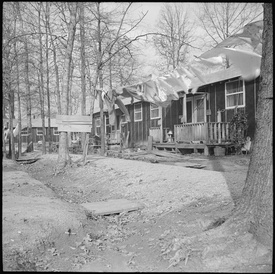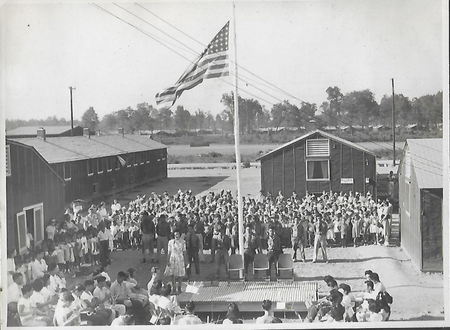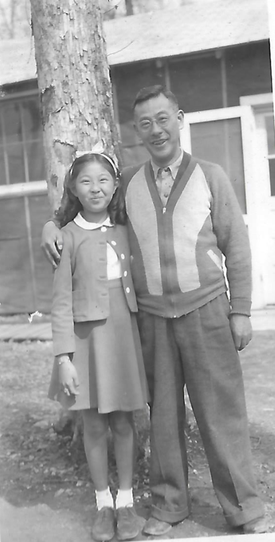And so when you got to Rohwer, what do you remember about it?

The humidity, and the mosquitoes. There were a lot of forests, really in the forest. I mean, you could you see trees all over.
What did you end up doing for fun? Did you make friends there?
We were all in blocks, so we were with our age group. I was active in the Girl Scouts. That's what they had for us at my age group.
What were some of the things you did as a Girl Scout?
I can't recall [laughs]. It was just to get together with our peers. The girls were very nice. The leader ended up in Cincinnati. She was very nice, was Japanese. I remember her very well. I knew that we lived in the last block in that area near the forest. A wooded area.
That's why Arkansas was so different than the other camps because it was wooded, everything else was desert.
And our Block 7 happened to be the corner. The last block in the area because one through seven and then backtracked to twelve.
And what was the food like? Do you remember the food?
Just the fact that we had to eat in the mess hall. And what bothered me was we lost that whole family unit because the children would sit with their friends. You know, that was really lost. I think that was sad because we were a very close knit family and we all of a sudden lost that.
You weren't sitting with your parents anymore?
Oh, no. I don't know why, but I guess I miss that. You know, it's tradition that we had that was gone.
Did your parents work in camp?
My father was a block manager. So he had a lot of responsibility.
Was he bilingual?
Well, to a certain extent. He could just sort of get by in broken English.
So there are four of you then in Rohwer: Masako, yourself, then your mom and dad?
Oh, yes. Yes.
Were you close with your sister?
Yes, I was the spoiled one because I was the last menopausal child coming in. Nine years later, They spoiled me, and I don’t remember too much.
Your parents had all daughters.
Isn't that strange?
Yes. My father was so upset when I came along, he just went out and got drunk that day. Because he was really looking forward to a boy. You know, they [the doctor] determines the sex. And he goes, “It’s his fault” [to Sets’ dad].
Sandy: Out of five, and they never had a boy.
Sets: And you know, in the Japanese culture, women don’t count.
Back then, it was very different.
Sandy: Chinese culture is that way too.
Do you remember anything about school in camp?
Setsuko: Well, I remember our desks were made of logs. I still have a picture.
Sandy: And do you remember that teddy bear you had? That was the one you took to camp, huh?
Setsuko: My Panda bear? That’s the same one I have [laughs].
Sandy: And it looks really old obviously. I was going to take it to the dry cleaner to see what they could do with it. I'm kind of scared it will fall apart, but it is in pretty good shape.
Setsuko: It still has eyes.
Do you know who gave it to you?
You know, my father bought it one night. We used to go out a lot on weekends and go to the movies. And then we'd always stop at a drugstore because my father had to have his cigar. And I saw it there and he bought it for me. I still remember that. Oh, it was near the Orpheum Theater back in L.A., downtown.
That's really that's amazing. You should keep that though as a family heirloom.
Sandy: Right. Yeah. I really can't believe that it’s traveled all the way, you know.
So you started junior high in camp?
Something like that. My first impression was [it was the] first time all the Japanese were together, no whites that were there, they were all Japanese. I think I was more impressed with the idea of the area. Find all these Japanese not in Little Tokyo, but in the wooded area. And we sat in these log desks in alphabetical order.
And you were there for all three years in camp?
Yeah, until the war was over.
Even though you were too young at the time, knowing what you know now about the loyalty questionnaire, what are your thoughts about it?
Well, I feel that everything happened because of the color of my skin, the way we look. And I think that impressed me more so when I went to the South, because that's where there's really discrimination. And I grew up there.
When you say South —
In New Orleans, I lived in New Orleans for 15 years.
Oh, this is after camp.
Yes.
Why New Orleans?
My father was somehow in the shrimp business. He couldn’t speak English, couldn’t write English, so he wrote in characters. And he somehow was accepted by this Chinese man who was so kind to us. And he invited him to come there from Rowher to New Orleans. So we were in the shrimp business. I lived in New Orleans for 15 years.
That's fascinating. I have never heard of somebody relocating to the South after.
That was unusual. But I love the South. They're a different breed.
Segregation and all that was still happening, right?
Oh yes. We were considered white. Very interesting. Because the public restroom: White and colored.
And what were you were able to use?
White. That was sort of interesting. I thought, okay, colored. No way. It is definitely black. It's very prevalent even to this day.
And then buses.
Yes, They sit in the back. We would be sitting in the back, and they told us to come to the front. It was interesting for me to go through that. That was in the early stages.
Who would tell you to move to the front? Who would say that to you?
All the other ones who were sitting on the bus. But I don't know if they were white or, most of them were white. The blacks wouldn't say, they're not vocal. It's very sad. And they’d keep to themselves and they were more comfortable that way, too, to keep it to themselves. I mean, you go to a public restroom. Definitely we were considered white.
Did you experience any backlash? Even though you were considered white in the segregated South, did you experience any kind of discrimination from either side?
Not at all, not at all. They considered us white.
Even after the war?
Even after the war. They had never seen Japanese. And they thought we were Chinese. But they don't have many Chop Sueys because it's almost all French cooking down there. So they don't get the restaurants. People go to New Orleans to eat southern food. [laughs] It's a beautiful city though. I loved it. And people are so different.
In what way?
They’re very kind to us. Really different from Californians. Californians are selfish. They think of themselves, go forth and go ahead, you know. But the South, they’re very hospitable, they think of you. They're friendly. I loved it. I could live there all the time. As it was, I lived there fifteen years.
To be continued ...
* This article was originally published on Tessaku on March 8, 2020.
© 2020 Emiko Tsuchida








